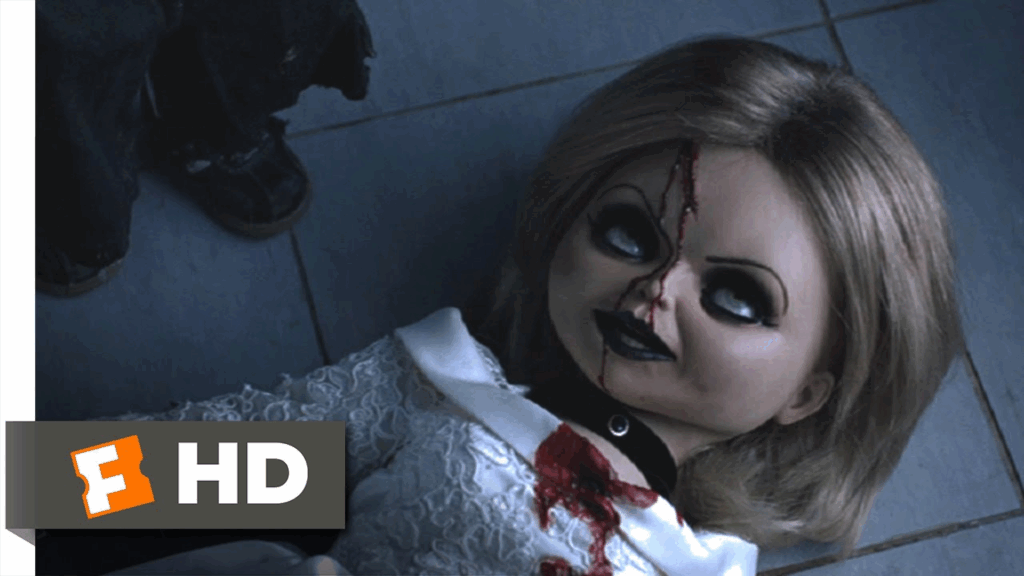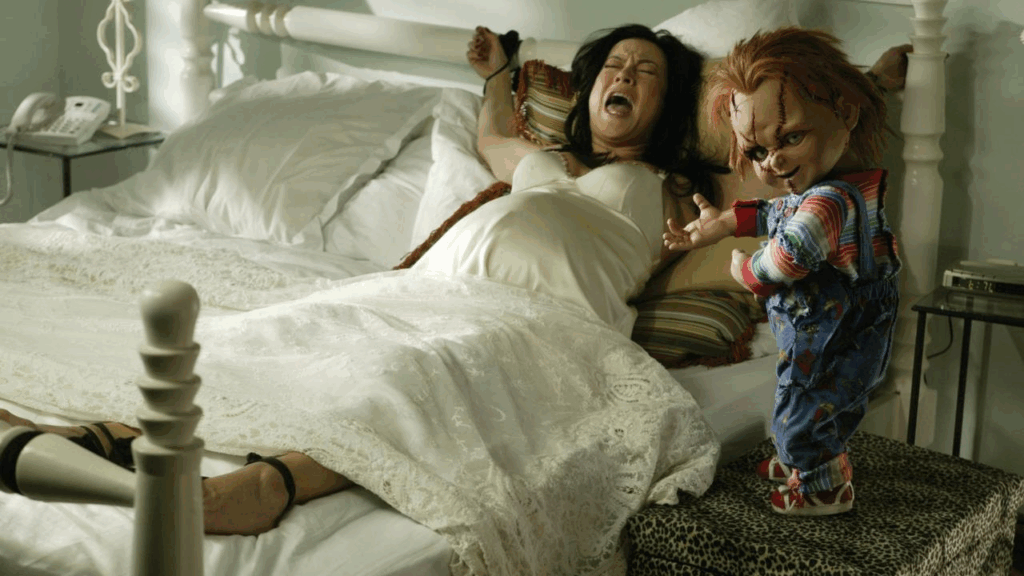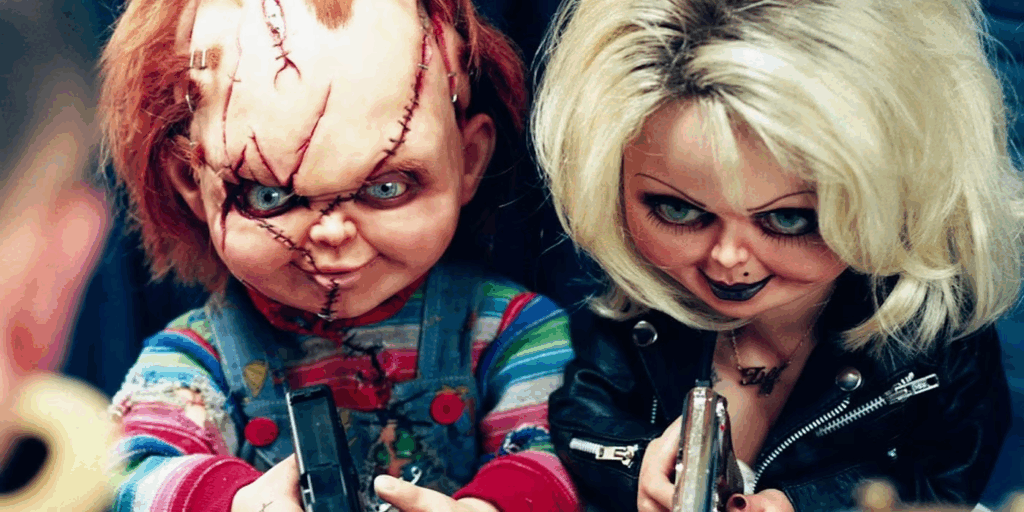Seed of Chucky

Introducing Seed of Chucky: A Campy Horror-Comedy Classic
Overview
Seed of Chucky, released on November 12, 2004, is the fifth installment in the Child’s Play franchise, a series that has captivated horror fans since its debut in 1988. Directed and written by Don Mancini, the creator of the franchise, this film marks his directorial debut and takes the series in a bold, self-aware direction. Unlike the earlier films, which leaned heavily into straightforward horror, Seed of Chucky fully embraces a horror-comedy hybrid, blending gory thrills with meta-humor, Hollywood satire, and themes of identity and family dynamics. With a runtime of 88 minutes, the film stars Jennifer Tilly, Brad Dourif, Billy Boyd, Redman, Hannah Spearritt, and John Waters, delivering a wild, irreverent ride that has earned its status as a cult classic.

Plot Summary
Set six years after the events of Bride of Chucky (1998), Seed of Chucky introduces Glen/Glenda (voiced by Billy Boyd), the orphaned offspring of the infamous killer dolls Chucky (Brad Dourif) and Tiffany (Jennifer Tilly). Glen, a gentle and conflicted ventriloquist’s dummy, is living a life of abuse under a cruel British ventriloquist in England. After seeing a television preview for a Hollywood film titled Chucky Goes Psycho, which features animatronic versions of Chucky and Tiffany, Glen realizes they are his parents. Desperate to reunite with them, he escapes to Hollywood and uses a voodoo amulet, the Heart of Damballa, to resurrect the killer dolls.
Once revived, Chucky and Tiffany are shocked to learn they have a child, but their reunion quickly spirals into chaos. The couple’s differing parenting styles lead to conflict: Chucky, a gleeful serial killer, wants Glen to embrace his murderous legacy, while Tiffany, starstruck by Hollywood and her idol Jennifer Tilly (playing herself), aspires to reform and go “clean” by joining a 12-step program for serial killers. The ambiguity of Glen’s gender—lacking genitalia—sparks a humorous yet poignant dispute, with Chucky naming him “Glen” and Tiffany insisting on “Glenda,” referencing the 1953 film Glen or Glenda and exploring themes of gender identity.
The trio’s antics unfold against the backdrop of a meta Hollywood setting, where a fictional film about Chucky and Tiffany’s urban legend is in production. Jennifer Tilly, playing an exaggerated version of herself, becomes an unwitting host to the killer dolls’ schemes. Tiffany hatches a plan to possess Tilly’s body and impregnate her to provide human vessels for their souls, leading to a series of absurd and gory events. The film culminates in a chaotic climax involving twins, body-swapping, and Chucky’s surprising decision to embrace his doll form, marking a shift in his motivations from previous films.

Cast and Characters
- Brad Dourif as Chucky: The iconic serial killer doll, voiced with wicked charm by Dourif, who has been a staple of the franchise since its inception. Chucky revels in his violent tendencies and struggles with fatherhood, pushing Glen to follow in his murderous footsteps.
- Jennifer Tilly as Tiffany and Herself: Tilly delivers a dual performance, voicing the glamorous and conflicted Tiffany while playing a satirical version of herself—a has-been actress desperate for a comeback. Her self-aware performance is a highlight, poking fun at her own career and Hollywood’s excesses.
- Billy Boyd as Glen/Glenda: Known for his role as Pippin in The Lord of the Rings, Boyd brings a tender, Dickensian quality to Glen, a doll grappling with his parents’ violent legacy and his own gender identity. His performance adds emotional depth to the film’s campy tone.
- Redman as Himself: The rapper plays a fictionalized version of himself, a director considering Tilly for a biblical epic. His comedic chemistry with Tilly adds to the film’s satirical edge.
- Hannah Spearritt as Joan: A supporting role as Tilly’s assistant, caught up in the dolls’ mayhem.
- John Waters as Pete Peters: The cult filmmaker appears as a sleazy paparazzo, delivering a memorable cameo that enhances the film’s campy vibe.
- Additional Cast: Includes Keith-Lee Castle as the abusive ventriloquist Psychs, Steve West, Tony Gardner, and Jason Flemyng in smaller roles.
Production and Development

Seed of Chucky was a bold departure for the Child’s Play franchise, driven by Don Mancini’s vision to explore new thematic territory. Inspired by the 1953 cult classic Glen or Glenda, Mancini, who is openly gay, infused the film with LGBT themes, particularly around gender identity and acceptance. Universal Pictures initially rejected the script, deeming it “too gay,” but Focus Features greenlit production under its Rogue Pictures label after the success of Cabin Fever (2003). Filming took place primarily at Castel Film Studios in Romania to cut costs, with a budget of $12 million. The use of animatronics and practical effects, led by puppeteer Tony Gardner, brought the dolls to life with fewer puppeteers than earlier films, thanks to advancements in radio-control technology.
The film’s meta-humor and Hollywood setting were influenced by films like Wes Craven’s New Nightmare and The Player, blending reality and fiction. Mancini’s decision to lean into comedy was informed by the diminishing scariness of familiar horror villains like Freddy Krueger and Jason Voorhees, allowing Seed of Chucky to embrace its absurdity while tackling deeper themes.

Themes and Style
Seed of Chucky is a self-aware, campy satire that distinguishes itself from its predecessors through its blend of horror, comedy, and social commentary. The film explores:
- Gender Identity: Glen/Glenda’s ambiguous gender and the parents’ conflicting expectations reflect real-world struggles with identity, making the film a progressive studio release for its time.
- Family Dynamics: The dysfunctional relationship between Chucky, Tiffany, and Glen/Glenda mirrors domestic dramas, with darkly comedic takes on parenting and addiction (Tiffany’s 12-step program).
- Hollywood Satire: The film pokes fun at celebrity culture, with Jennifer Tilly’s exaggerated self-portrayal and Redman’s role as a director adding layers of meta-humor.
- Camp Aesthetic: From Chucky’s The Shining-inspired lines to John Waters’ cameo, the film revels in its over-the-top, theatrical style, earning praise as a “distillation of Camp.”
The film’s visual style, constrained by budget, embraces an artificial aesthetic that suits its surreal narrative. Pino Donaggio’s score complements the blend of horror and humor, while the use of licensed music, like “Carol of the Bells,” adds to the chaotic tone.

Reception and Legacy
Seed of Chucky received mixed reviews upon release, with a 4.9/10 rating on IMDb and a 33% score on Rotten Tomatoes. Critics like Roger Ebert gave it two stars, calling it “wretched” yet “funny,” while others praised its bold shift to comedy and its exploration of gender and camp. Audience reactions were polarized—some fans embraced its absurdity, while others felt it strayed too far from the franchise’s horror roots. The film grossed $24.8 million worldwide against its $12 million budget, opening at #4 in the U.S. box office with $8.7 million.
Despite its divisive reception, Seed of Chucky has grown into a cult classic, particularly among fans of campy horror and queer cinema. Its unapologetic weirdness and progressive themes have been lauded in retrospectives, with outlets like Out calling it a “campy cult classic” and Roger Ebert noting its “darkly funny look at queerness and camp” 20 years later. The film’s influence is evident in the franchise’s continued evolution, with Glen/Glenda referenced in later entries like Cult of Chucky and the Chucky TV series.

Availability and Special Features
Seed of Chucky is available on platforms like Netflix, Shudder, and Movies Anywhere, with both theatrical and unrated versions (the latter including an additional minute of footage). The 4K Ultra HD and Blu-ray Collector’s Edition from Shout/Scream Factory features crisp visuals and extras like audio commentary by Don Mancini and Jennifer Tilly, a “Slashed Scene” with commentary, and the short film Chucky’s Vacation Slides, set after the movie’s events.
Cultural Impact
The film’s irreverent humor and boundary-pushing content, including its explicit scenes and gore, sparked controversy but also cemented its place in horror-comedy history. Lines like “You can always smell it on girls who sell it” and Chucky’s quip about violins ruining the country have become fan favorites. Its exploration of gender identity, though not without flaws, was groundbreaking for a mainstream horror film in 2004, influencing discussions about representation in genre cinema.

Conclusion
Seed of Chucky is a fearless, chaotic entry in the Child’s Play franchise that trades scares for laughs and introspection. With its all-star cast, meta-humor, and bold thematic choices, it remains a divisive yet unforgettable chapter that celebrates the absurdity of killer dolls while tackling issues of identity and family. Whether you’re a fan of the franchise or a lover of campy horror, Seed of Chucky offers a wild, gory, and surprisingly heartfelt experience that continues to resonate 20 years later.